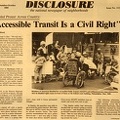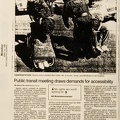The Daily Sparks Tribune
April 14, 1989 page 4A
[Headline] Push a wheelchair through Sparks
by Andrew Barbano
In all the heat generated by die wheelchair protests this week at the Sparks Nugget, the central issue has been lost: does every bus in the country need wheelchair lifts? I thought Donna Cline might shed some light on the real reason behind the ruckus.
Cline, 30, was injured in a rural Nevada accident. She and Debra Donlevy were driving to Carson City late one night 11 years ago. Their car overturned near Hawthorne. Donna survived the long ride to Reno, Debbie was not so lucky. We buried her in Carson City while Cline lay in Washoe Medical Center. Debbie was my wife's daughter.
Donna, who has not walked since, worked her way through broadcast school and became a television reporter. In 1985, while working at KVBC in Las Vegas, she was asked to compete for the Miss Wheelchair Nevada title. She won. And added the Miss Wheelchair America title in 1986. She took the cause of better access for the handicapped all the way to Ronald Reagan in the White House.
“I leaned a lesson in it all," she told me this week from Springfield, Missouri, where she is a news co-anchor. "I found out that you'll get some awareness but you may not get what you set out to get.“
Peter Mendoza would probably agree. The unemployed Bay Area police dispatcher was here to attend the protests during the American Public Transit Association convention. He lost his job because of transportation problems, and has been protesting at APTA conventions for the past three years. “I‘m not used to being treated like a criminal,“ Mendoza says.
“We're not a bunch of violent radicals. There are children here and people who’ve worked all their lives. We’re not radicals. We just want to make a point." He says that a lot of this week's problems could have been avoided. “In San Francisco, we sat down with APTA and the police and worked out the parameters of a demonstration. We even arranged for the peaceful arrest of those who thought they wanted to do so. We worked out training and helped arrange transportation. The judge sentenced those arrested to the overnight time served. There were no hard feelings. Sparks is 20 years behind the times when it comes to protests."
Cline says “protest to increase awareness is wonderful but has anything more actually been accomplished? In the four cities I've live in, the demand (for wheelchair ramps) does not meet the number of buses. If you're going to take that amount of money, you should look at usage."
She favors a specialized transportation system such as this area's Citilift. One caller to my radio show did not agree. "Separate is always unequal," he snapped.
Mendoza, a member of the Golden Gate Bridge Highway and Transportation District‘s advisory committee on services for persons with disabilities, backs up this argument with numbers. “The Alameda-Contra Costa transit system did a study which showed a $10.84 cost per trip on a ramp-equipped bus. A paratransit system (like Citilift) costs $12.46 a trip." He says that nationally, the paratransit system is more expensive. Citilift figures bear him out. Such service is very specialized and will always cost more.
“A bus ramp costs about the same as an air conditioning system, and I consider that a luxury. If you want to get rid of something that costs a lot, get rid of air conditioning."
Mendoza feels specialized paratransit systems are good for rural areas, but Metropolitan areas need bus lifts. “Only three percent of the 37,000,000 disabled in this country are working and transportation is the number one reason," he passionately adds.
Since I started doing talk shows, I've never had a week where one issue totally dominated as this one has. Many of my phone calls were from wheelchair users. Some Sparks residents feel that Mendoza and his group are just a bunch of out-of-town agitators who should leave.
Others have accused the Sparks Police, John Ascuaga and his people of failing to defuse the situation upfront, as was done in San Francisco. Another said Nugget security guards were poorly trained and they have been the main problem.
Mendoza's organization, ADAPT, almost seems to be contradicting itself by its actions. ADAPT has made its biggest gains in court and in Congress, not on the protest lines. After Congress passed a law mandating lifts on all buses, APTA got the law watered down to provide for local option. ADAPT sued and won on appeal. The protests this week centered on convincing APTA not to take its appeal to the U.S. Supreme Court.
Ironically, a small news item appeared Tuesday noting the “Disability Awareness Festival" starts April 14. Wrong. It started Sunday at the Nugget. Maybe Sparks just needs to promote better understanding.
The best suggestion I've heard came from a retired Sparks Teamsters Union worker named Mitch. He suggested a handicapped awareness day where civic leaders work a day in a wheelchair to see what it's like. I like that idea. So does Donna Cline.
Any takers?
(Andrew Barbano is a Reno-based syndicated columnist. He host a weekday morning news and talk show an Reno AM radio station KOLO 92.)
Photo:
President Ronald Reagan standing, head slightly tipped to his left. Seated beside him, and coming up to about is waist, is a woman in a wheelchair with conservatively coiffed hair and attire. Both are looking at the camera and smiling.
Caption reads: Donna Cline, a former Miss Wheelchair Nevada and Miss Wheelchair America, with former President Ronald Reagan.
- Created on
- Thursday 11 July 2013
- Posted on
- Wednesday 7 October 2015
- Tags
- APTA convention, Citilift transit, Donna Cline Miss Wheelchair AZ, Nugget Casino, paratransit, Peter Mendoza, President Reagan, radicals, Reno/Sparks, San Francisco, talk show, Teamsters, wheelchair lifts
- Albums
- Visits
- 1932
- Rating score
- no rate
- Rate this photo


0 comments